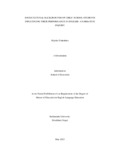
Please use this identifier to cite or link to this item:
https://hdl.handle.net/20.500.14301/514Full metadata record
| DC Field | Value | Language |
|---|---|---|
| dc.contributor.author | Tsukahara, Kiyoko | - |
| dc.date.accessioned | 2025-06-11T11:24:43Z | - |
| dc.date.available | 2025-06-11T11:24:43Z | - |
| dc.date.issued | 2025-05 | - |
| dc.identifier.citation | Tsukahara, K. (2025). Sociocultural background of girls’ school students influencing their performance in English: A narrative inquiry. | en_US |
| dc.identifier.uri | https://hdl.handle.net/20.500.14301/514 | - |
| dc.description.abstract | The aim of this research is to explore the influence of socio-cultural background on English language learning among students at a girls' secondary school in Dolakha district, Nepal. Having grown up in a monolingual, monocultural society, I have developed a keen interest in the differences and challenges that arise in a multi-ethnic, multi-cultural society such as Nepal. This research aims to identify the socio-cultural factors that students from culturally diverse backgrounds face in English language learning. Previous research has focused on the inequality of women's education and the diversity of languages as factors that create disparities, and there have been many studies on the importance of education using one's native language. However, this research focuses on students attending an all-girls school in an environment that does not specifically adopt native language education as a school policy. I conducted this research with the awareness that by advancing research from this perspective, new insights into English education could be gained. In this study, I adopted a narrative inquiry approach and conducted semi structured interviews with English teachers at a girls' secondary school in the Dolakha district. Through these interviews, I explored in detail the teaching practices of the teachers and the ways in which they responded to the socio-cultural challenges faced by their students. In particular, I focused on how students from various ethnic backgrounds learn English and how these factors influence this learning. In addition to the interviews with the teachers, I also analyzed the ethnic and linguistic backgrounds as well as the English performance of students in each grade. Based on this data, I conducted a comprehensive examination of the ways in which ethnic, linguistic, and family backgrounds affect students' English abilities. The results of the study showed that ethnic background does not have a significant impact on English learning. Instead, factors such as the family's educational environment, support system, and regional conditions were found to have a greater impact on learning outcomes. The teachers emphasized that respecting and supporting the diverse backgrounds of students is the key to improving learning outcomes. In addition, the study showed that support from the family and cooperation between the school and the local community are essential for motivating students and increasing their desire to learn. This study provides valuable insights into the intersection of sociocultural context and language education. It reveals how teachers respond to the realities of their students and adjust their teaching practices accordingly. It also shows that English performance is closely related not only to the efforts of schools and teachers but also to how much children's education is observed and practically supported by parents at home. This emphasizes the need for policies that strengthen cooperation between schools and families. It is proposed that such policies are essential to support better the diverse needs of Nepalese girls' secondary schools, including the need to provide special educational opportunities for children in geographically disadvantaged situations. | en_US |
| dc.language.iso | en | en_US |
| dc.publisher | Kathmandu University School of Education | en_US |
| dc.title | Sociocultural Background of Girls’ School Students Influencing Their Performance in English: A Narrative Inquiry | en_US |
| dc.type | Dissertation | en_US |
| local.school.name | SOED | en_US |
| local.school.department | DOLE | en_US |
| local.school.program | Master of Education in ELT (2 years) | en_US |
| local.school.level | Masters | en_US |
| Appears in Collections: | Research Report | |
Files in This Item:
| File | Description | Size | Format | |
|---|---|---|---|---|
| WCC 23May 2025_Final version of Research Thesis_withToC.pdf | 1.28 MB | Adobe PDF |  View/Open |
Items in DSpace are protected by copyright, with all rights reserved, unless otherwise indicated.